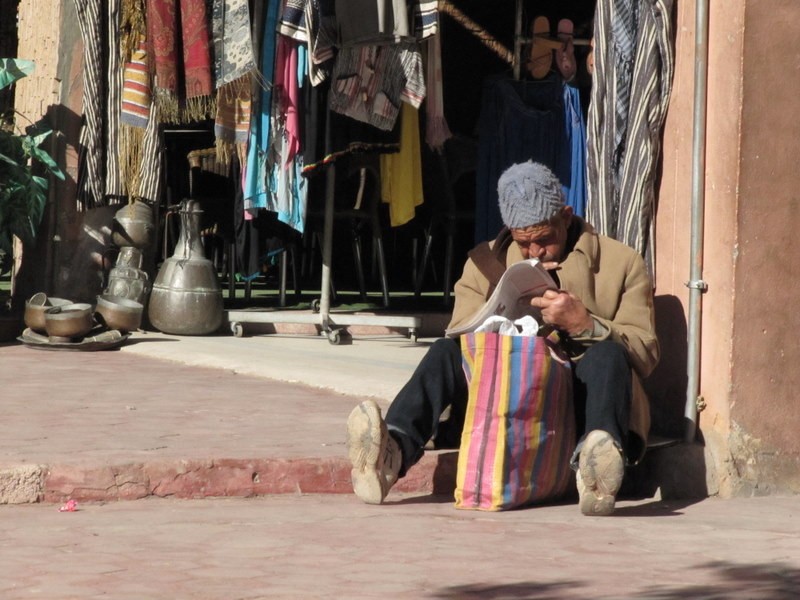New Press Code in Morocco to Still Send Journalists Behind Bars
A revised press code in Morocco was hoped to give journalists more room to report freely. But a closer look shows that nothing has really changed.
The gravest legal threat to media freedom in Morocco are the laws that restrict the type of content that can be publicly communicated. The 2002 Press Code and the 2003 antiterrorism law put forward criminal penalties for any criticism of “sacred” issues such as the monarchy, Islam and territorial integrity. These laws continue to be applied to online activity, resulting in the prosecution of several online journalists and activists. The minister of communication, Mustapha El Khalfi, in an attempt to modernize the Press Code, released an updated version for review and consultation by civil society in October 2014. The law has not yet been submitted to Parliament for final approval and adoption.
But does this updated law solve all the journalists’ problems? Far from it.
Untouchables
A closer look at the new version of the law shows deeply conflicted thinking in amending this act. On the one hand, the new Press Code brings about many positive advances such as the elimination of jail sentences for journalists and the establishment of a self-regulatory body, the National Press Council. On the other hand, it instills a culture of prior restraint and further cements self-censorship. A close look at both versions of the law, 2002 and 2014, shows that the oppressive nature of the legal environment for journalism in the country is not changing.
In the 2002 law, article 38 defined “incitement to commit a crime” as any provocative speech that is uttered, written, printed, sold, or distributed in public places or meetings, as well as in any audiovisual and electronic media. This has a chilling effect on journalists, including those working for online media, when they report independently and freely.
In the same 2002 law, article 41 put forward jail sentences from three to five years and fines ranging from MAD 10,000 (US$800) to MAD 100,000 (US$8,000) for anyone who offends the institution of the monarchy, king and the royal princes and princesses, Islam and the territorial integrity. The publications that are found guilty of such an offense can also be suspended for up to three months or can be permanently banned. Similarly, the 2002 Press Code put forward jail sentences from one month to one year for defamation of courts, the military, public administrations, members of the government, and any public official.
Terms such as “offense” or “public order” were defined loosely or vaguely, leaving room for abusive interpretation. They give judges generous room to read the law as they want, resulting in a legal environment that stifles freedom of expression in all its forms. In one case from August 2014, a 17-year old rapper Othman Atiq was sentenced to four months in jail from August to November 2014 under charges of “insulting a state institution,” “incitement to drugs consumption,” and production of material “harmful to public morality.” He was charged for a rap music video clip he posted on YouTube.
Dust in the Eye
The key positive changes in the proposed Press Code are provisions to eliminate jail sentences for journalists and create a self-regulatory body for the journalistic field. However, the taboo topics were preserved in the new code and jail sentences have been replaced by steep fines. Articles 76 and 77 of the new act put forward fines of up to MAD 200,000 (US$20,000) for publication of what can be seen as offensive content about the monarchy, Islam, and territorial integrity. These fines are practically unaffordable for any journalist in Morocco. Moreover, the newly drafted law allows the state to seize foreign publications in case they breach the taboo-related provisions.
And this is not the end. In a move that is likely to stifle online freedom, the new press code requires online news portals to register their domain names in Morocco as a condition to obtain press cards and benefit from financial state support. News portals must also acquire three types of authorizations to operate, which are valid for one year. An authorization has to be obtained from the broadcast regulator (High Authority of Audiovisual Communication, HACA) if an internet portal wants to post online videos. Another authorization is required from the telecom regulator (National Agency for Regulation of Telecommunications, ANRT) to host domain names under press.ma domain. Yet another authorization is required from the Moroccan Cinema Center (CCM) if films are to be shot by an online portal. These three bodies are state-controlled and can easily be inclined to deny authorizations or reject renewals for political reasons.
At the end of the day, even the elimination of jail times is dust in the eye as journalists who fail to pay fines will be subject to imprisonment, according to Reda Benotman, an activist and online journalist who is a founding member of Freedom Now, a media freedom association banned by the state. Instead of putting journalists in jail, the state puts jail inside journalists’ minds.
In short, the attempt to revamp Morocco’s media regulation is contradictory because regulating what is free in modern democratic societies is actually limiting freedom of expression. The intent behind such regulation is to suppress media freedom while still give the impression of breaking with the past is deliberately manipulative and dishonest.
Photo: Martijn Munneke

